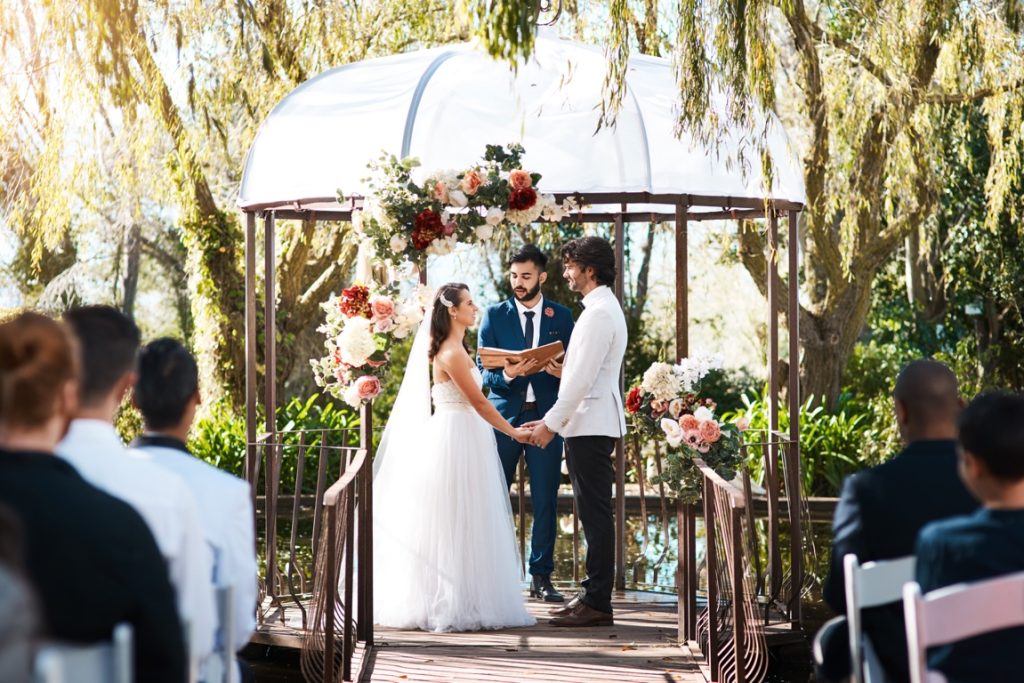There are many ways couples can make their loved ones feel special during their wedding. They can invite them to pre-wedding parties, include them in traditions, and more. Perhaps one of the most touching and significant ways, however, is being asked to officiate the wedding.
Officiating your friend’s wedding may sound like a daunting task; after all, there is public speaking — and a lot of responsibilities — involved. However, below is a full guide for how to officiate a friend’s ceremony, starting with what to discuss and how to get ordained.
Officiating a Friend’s Wedding: A Foolproof Guide

Step 1: Have a Discussion With the Couple
A couple telling you they want you to officiate their wedding is a cause for celebration. After all, it is a tremendous honor. However, you should sit down and have a conversation with the couple about their expectations as soon as possible.
You should first figure out if you need to get ordained. If the couple will have a courthouse ceremony, you might not need to go through this process. Otherwise, you have to start looking into organizations that can ordain you.
You also need to listen to the couple about how they envision their special day. What do they want to include in their ceremony? What tone do they want you to set?
These conversations might occur on multiple occasions, and the couple might change their minds a few times, but always listen to them with an open mind.
Step 2: Get Ordained

On the occasion that you need to get ordained to officiate your friend’s wedding, the first substep is determining the pertinent rules in your location. The regulations vary per state; some are stricter than others.
Next, find the organization you want to be ordained by. You can explore many online options, such as the Universal Life Church and the American Fellowship Church. While browsing your choices, pay attention to which is the right fit.
- Does the state where the wedding will be held recognize the organization?
- Do you agree with the organization’s core principles and beliefs?
- Is the organization’s operations ethical and clear?
Once you find the organization you want to work with, follow its application process. You might have to fill up an online form. Afterward, you will hear back from them if you are accepted; if so, you will receive a Minister ID or a credential you can print.
In some states, you have to visit a town or city clerk before performing a wedding. You may have to present your credentials, give some basic information, and submit proof of your ordination. Again, the laws vary per state, so do as much research as you can about the process.
Step 3: Learn the Ropes of Officiating a Friend’s Wedding
As you wait for your ordination application to be processed, start reading up on how to actually officiate your friend’s wedding.
Look at sample scripts for wedding ceremonies. Try searching for videos and other reference materials. While you should not copy what you see word-for-word, you can take notes about how to deliver speeches, move from one part to the next, and engage the crowd.
If you feel you need more help, approach people you know with experience in officiating a friend’s wedding. Ask them for tips, advice, and words of wisdom. You can also talk to the organization that ordained you; they might provide toolkits or other forms of assistance.
Step 4: Start Writing Your Script

Around six months before the wedding, you should begin your ceremony script. By this point, the couple might have a clear idea of what they want to include in their itinerary.
Begin with an introduction. If you do not know where to start, greet the guests first and thank them for coming. You can share personal insight about the wedding itself — do you think the wedding venue is majestic? Do you think the bridal crew looks amazing?
You can proceed with sharing some backstories for the couple’s relationship. How did they meet? When did you realize they were perfect for each other? When did it become clear that their relationship was going to the next level?
While officiating a friend’s wedding, you can share some thoughts and words about love. Think of a beautiful metaphor for marriage. What does love mean to you or the couple, and how has its meaning changed over time?
You can also say positive things about the couple. Describe what it is like to be close to them, how their love — and they themselves — inspires you.
After your introduction, the exchange of vows follows. Afterward, the couple will put on their rings and perform a unity ceremony if they want. You can include some readings, prayers, or well-wishes between these parts.
The ceremony ends with the pronouncement of marriage, where the couple kisses — or does an alternative — to mark the start of the new chapter of their lives.
Step 5: Ask the Couple for Comments on Your Script
Since it is their wedding, it is wise to show your script to the couple as soon as possible. Ask them for notes and points of improvement. Ask them what you should shorten, lengthen, add, or completely remove.
Take these notes and apply them. Editing your script might get tedious, but it is necessary. Coordinate with the couple as closely as possible; make them happy, as it is their wedding you will officiate.
Step 6: Practice Your Delivery
Read your script out loud. Doing so will help you determine where to breathe, what phrases to emphasize, and which parts do not flow naturally. Even when you think you are done revising, you will come up with ways to improve your speech.
This step is particularly important if you think public speaking is not your strong suit; simulate officiating a friend’s wedding by inviting some people to watch you practice your script. Ask them for insight and constructive criticism.
Step 7: Polish the Details

Ask the couple what you should wear. Once you know, find the appropriate attire and get it altered if necessary.
Coordinate with the wedding planner, coordinator, or venue staff for other logistical matters. Is the sound system reliable? Do you need to make any announcements or housekeeping reminders before the ceremony starts? When do you walk in?
You have the opportunity to practice the entire ceremony at the rehearsal dinner. Make sure everything is clear: places where to stand, music cues, materials for the unity ceremony, roles of the bridal party, and so on. Ask all the questions you need.
The couple may ask for some revisions on the script. Show them the finalized version before printing several copies — one for you to read from throughout the ceremony.
You might also have to take a moment to review the marriage license. In some states, the newlyweds must hand off the license to the pertinent authorities. In this case, remind them of the process and what they have to do.
Step 8: Officiate the Ceremony

Get a full night’s sleep, eat a filling meal, take a deep breath, and repeat some positive affirmations if they will help you.
Public speaking is always nerve-wracking, but you should remind yourself that you were chosen to officiate your friend’s wedding for a reason: they love you and think you are capable.
Have fun and do your best!
